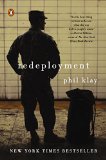Summary | Excerpt | Reviews | Beyond the book | Read-Alikes | Genres & Themes | Author Bio

Truth is stranger than fiction. Matt Young's memoir tackles the space in between truth and fiction to highlight his essential theme: war sucks but people keep taking a bite out of it. The title comes from a Marine Corps quip "Eat the Apple, F*#* the Corps" muttered when the going gets tough, as it often does.
From the first moment of Marine Corps enlistment through boot camp and three deployments to Iraq, Young remembers his experiences in short episodes. A cinematic attention to setting is juxtaposed with the author's interior sense of being. Short, creative chapters flash forward and back in time. Chapter titles like "Choose Your Own Adventure", "How to Feel Ashamed for Things You Never Did", "Meeting the Mortar God" and "Brothers" summon the reader behind the scenes of the military and also into the musings of this one particular Marine. Many of the chapters stand alone; collected they resonate with a creative thirst to make sense of life in a war zone, life after deployment, and life in general.
Young plays with literary form and ever-changing points of view, devising clever strategies to jump into difficult emotional territory. "The Drill Instructor at Rest" presents a vivid character study of the villain that boot camp Marines love to hate. During indoctrination:
Past-me is often told he will die. He is told he will die because he hasn't cleaned his barracks room properly. He is told because he lacks attention to detail he will be shot in the face. He is told he will not only get himself killed, but that he'll get his friends killed as well. Past-me is told he will die so much that at times he wonders maybe if he isn't dead already.
The tone throughout Eat the Apple is ambitious and intense as if writing is the way to save one's life. It is often humorous, and fortified with poetic prose. Drawings and diagrams illustrate absurd details – for instance, sketches of larger-than-life flies next to a human highlight the chapter called "Enemies". And in "Packing Level: Expert" a diagram of the recruit's gear comes with a list of actual objects annotated with their hypothetical uses. Humor offsets stark reality. Item 17, Dog Tags, are for "Easy identification of body if maimed, killed, or incapacitated".
Every episode rings true by virtue of the fact that the author lived through these experiences of fear, pride, addiction, regret, relief, and ritualized violence. Young reckons with the way that sexual energy surges through war and the military. The chapter "Brothers" opens with "We Don't Ask. We Don't Tell." This references the policy then in effect concerning gays in the military. "We are trying to figure it out, trying to find ourselves in a world of testosterone and violence, a world where there is little room for love and tenderness." For me, the book enters uncomfortable territory when the author traps the reader in testosterone-fueled descriptions of masturbation, including a desert outhouse scene and a clever, illustrated invention called a portable partner. But given that a prime audience for this book is likely current, former, or aspiring servicemen, I applaud the author's honesty.
A multiple-choice test format explores myriad possibilities during a between-deployments night out. Traditional first-person prose also rings true, as when the author reflects: "If there's anything I've learned, it's to keep my hair long. It's the differentiating factor between the gung ho brain-washed eighteen-year-old I was when I joined and the civilian I desperately want to be".
Eat the Apple showcases memoir as an art form. Young deploys excellent and varied literary skills here, both to witness contemporary military service, and to heal from his tours of duty. "Our hearts will race and we'll stand inside our warm domestic houses remembering the thing we used to be in the desert, and we'll know we won't ever be able to leave the thing or the desert behind." This memoir will appeal to those who like behind-the-scenes, true stories about war, anyone considering enlisting, and anyone who loves a soldier. Eat the Apple is a raw, intimate rendering of one man's journey into and out of the Marine Corps.
![]() This review was originally published in The BookBrowse Review in March 2018, and has been updated for the
February 2019 edition.
Click here to go to this issue.
This review was originally published in The BookBrowse Review in March 2018, and has been updated for the
February 2019 edition.
Click here to go to this issue.

If you liked Eat the Apple, try these:

by Abdi Nor Iftin
Published 2019
The incredible true story of a boy living in war-torn Somalia who escapes to America--first by way of the movies; years later, through a miraculous green card.

by Phil Klay
Published 2015
Redeployment takes readers to the frontlines of the wars in Iraq and Afghanistan, asking us to understand what happened there, and what happened to the soldiers who returned.
Your guide toexceptional books
BookBrowse seeks out and recommends the best in contemporary fiction and nonfiction—books that not only engage and entertain but also deepen our understanding of ourselves and the world around us.